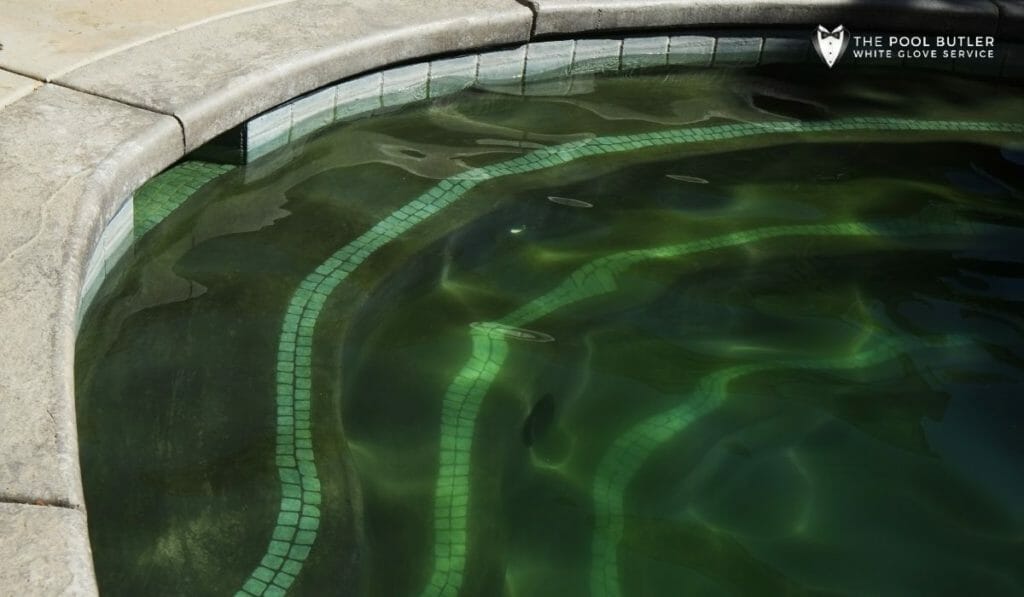When you need pool algae removal services in Atlanta, The Pool Butler is the only company you need to call.
Our swimming pool technicians have the necessary chemicals, cleaning equipment, and experience to effectively remove algae buildup in your swimming pool and spa.
With that said, the best algae removal method is to prevent algae from growing in the first place.
If you’re lucky enough to own an algae-free swimming pool—whether it be due to having a professional company (such as The Pool Butler) on your side to carry out proper pool maintenance and cleaning or you’re handling these efforts yourself—then you’ll want to be highly cautious; while taking the necessary steps to prevent algae growth.
The first step in algae prevention is to educate yourself on the causes of algae growth and identify the three main types of swimming pool algae that typically plague pool and spa owners in Atlanta and beyond.
Understanding Why And How Algae Grow
During the summer months (typically July and August), algae usually become a real problem for swimming pool owners everywhere.
The reason for this is a combination of your pool’s high summer temperatures and lower sanitization levels—a problem only seen with owners who fail to have the proper swimming pool cleaning plan.
Algae are a single-celled plant form that harnesses sunlight to create its food source, which we know as photosynthesis.
This allows it to flourish inside your pools and spas during summer, with extended hours of sunlight hitting the water.
Exploring The Different Types Of Algae
Algae come in a broad range of colors & varieties, making them highly adaptable and challenging to get rid of, especially if it has been allowed to grow for an extended period.
Algae are challenging to eliminate in a swimming pool because it is only detectable when it’s too late.
Due to its microscopic size, it takes millions of these plant forms to be noticed by the naked eye.

This is why it’s so important to prevent algae in the first place using particular methods—one of the most popular being the use of a saltwater chlorine system.
It would help if you also got to know the many varieties of algae as a means to identify and prevent them from growing in your pool.
Let’s explore the different types of swimming pool algae below and the best ways to prevent and eliminate each variety.
Black Algae
While most pool owners refer to this type of algae as black algae, it is, in reality, known as blue-green algae.
This algae typically grows in cracks and crevices of the swimming pool’s surface.
It is especially fond of plaster and concrete finished pools due to its rough surfaces.
Visually, black algae are known for their slimy appearance, which usually forms in a skeletal pattern along your pool’s surface, making it immune to standard chlorine levels.
While black algae typically do not adversely affect your water clarity or safety, they will leave unsightly black spots on your pool’s surface, and most pool owners want to run for the chlorine to get rid of them.
How Do The Professionals Get Rid Of Black Algae?
To effectively treat pools dealing with black algae growth, a swimming pool cleaning professional—like the technicians at The Pool Butler—will typically opt first to analyze and balance your pool water.
Next, before the removal of black algae can occur, a pool professional will thoroughly brush the algae from your pool’s surface to break through the slime layer.
After that, they will aggressively shock the pool and touch it again until the black algae are entirely removed.
Green Algae
The most common type of algae pool owners face the aptly-named green algae, which can turn your pool water green.
And unless you’re celebrating St. Patrick’s Day, that can make for a pretty disgusting swim.
Despite its name, however, green algae can sometimes appear blue-green, yellow-green, and even dark green.
Beyond turning your water green, green algae can also cling to the walls of your pool and leave stains on vinyl siding if not treated promptly.
How Do The Professionals Get Rid Of Green Algae?
When approaching green algae removal, a swimming pool cleaning professional will first analyze your pool’s water and pH levels to ensure the water is at the proper levels.
Your pool will then be brushed and vacuumed thoroughly before being shocked. During this process, your technician will check the pool’s filtration system to ensure the water flows correctly.
This process may be repeated a few times to remove all green algae from your swimming pool.
Yellow (or Mustard) Algae
Mustard algae are, in fact, a mutation of green algae. Like their predecessor, they are highly resistant to normal chlorine levels, making them nearly impossible to remove if you don’t have the necessary cleaning supplies.
Varying from yellow-green to brown, mustard algae typically look like dirt or sand on the sides or bottom of the affected swimming pool.
To rid your pool of mustard algae, a swimming pool professional will use the same techniques to remove black algae.
Finding Effective Swimming Pool Algae Removal Services In Atlanta
Regarding swimming pool algae removal, no company in Atlanta is more fit for the job than The Pool Butler.
In addition to a wide range of swimming pool maintenance, repair, and cleaning services, our company has been providing effective pool algae removal for years and can ensure your pool is back in tip-top shape in no time.
Don’t let algae ruin your swimming season; let The Pool Butler remove it for you, and get your pool water sparkling again so you can enjoy your backyard with your friends and family!
Conclusion
When it comes to pool maintenance and the removal of algae, The Pool Butler is the go-to company in Atlanta.
With their experienced technicians, specialized equipment, and effective cleaning techniques, they can tackle any algae buildup and keep your pool and spa algae-free.
While algae removal is crucial, it’s even better to prevent algae growth in the first place.
By understanding the causes of algae growth and the different types of algae, you can take the necessary steps to ensure a clean and pristine pool environment.
The Pool Butler offers various services, including pool maintenance, cleaning, and repair, to help you maintain a beautiful and enjoyable swimming pool.
Frequently Asked Questions (FAQ)
Q1. Why is algae a problem in swimming pools?
Algae can quickly grow in swimming pools, especially during summer, due to high temperatures and lower sanitization levels. It can affect water clarity, leave stains, and make swimming unpleasant.
Q2. How can I prevent algae growth in my pool?
Proper pool maintenance, including regular cleaning, balanced water chemistry, and adequate sanitization, is essential to prevent algae growth. Maintaining appropriate chlorine levels and using algaecides can also help.
Q3. How can I identify the different types of pool algae?

Algae can appear in various colors and forms. Green algae turn the water green and can cling to pool walls. Black algae form slimy black spots, often in cracks and crevices. Mustard algae look like dirt or sand on pool surfaces.
Q4. Can I remove algae from my pool myself?
While removing algae yourself is possible, it can be challenging and time-consuming. Professional pool cleaning services, like The Pool Butler, have the expertise and proper equipment to eliminate algae effectively.
Q5. How do professionals remove black algae from pools?
Professionals will analyze and balance the pool water, thoroughly brush the black algae, shock the pool, and repeat the process until the algae are entirely removed.
Q6. How do professionals remove green algae from pools?
Professionals will analyze the pool water and pH levels, brush and vacuum the pool, shock the water, and repeat the necessary process to obliterate the green algae.
Q7. What is mustard algae, and how is it removed?
Mustard algae is a resistant form of green algae. Professionals use techniques similar to those for black algae removal to eliminate mustard algae effectively.
Q8. How can I find professional pool algae removal services in Atlanta?
The Pool Butler in Atlanta offers professional pool algae removal services and other pool maintenance, repair, and cleaning services. Contact them for effective algae removal and a sparkling clean pool.
Q9. Can algae be harmful to swimmers?
While algae are not harmful, it can create an environment conducive to bacterial growth, leading to potential health risks. Maintaining a clean and properly sanitized pool is essential for the safety of swimmers.
Q10. How often should I have professional pool maintenance and algae removal?
The frequency of professional pool maintenance and algae removal depends on various factors, including the size of your pool, usage, and environmental conditions. It’s generally recommended to have regular professional maintenance at least once every few months to ensure a clean and healthy pool.
Contact The Pool Butler today to learn more about professional pool algae removal services in Atlanta or any one of our white glove swimming pool services.

